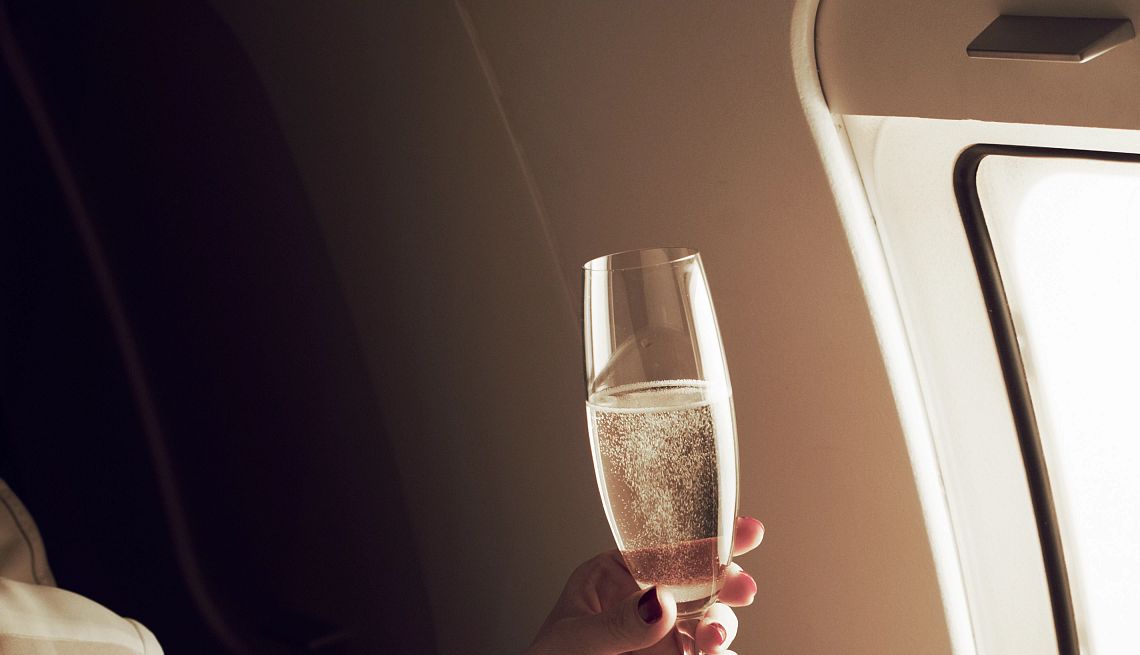AARP Hearing Center


Air travel can be stressful for any number of reasons, from flight delays to chaotic airports to cramped seating situations and beyond. No surprise then that some travelers reach for a glass of wine or a cocktail after boarding to help them unwind.
But new research suggests you may want to think twice before ordering an alcoholic beverage, especially if napping is also part of your in-flight plans.


AARP Membership— $12 for your first year when you sign up for Automatic Renewal
Get instant access to members-only products and hundreds of discounts, a free second membership, and a subscription to AARP the Magazine.
Alcohol + air travel can affect heart, oxygen levels
In a recent, first-of-its-kind study published in the BMJ journal Thorax, a team of researchers based in Germany looked at what happened when people fell asleep after consuming alcohol in a low air pressure environment designed to mimic that of an airplane. What they found was not only a disruption to participants’ sleep but also a drop in blood oxygen levels and an increase in heart rates.
Even in people who are young and healthy, the combination of alcohol and sleeping in low air pressure conditions “poses a considerable strain on the cardiac system” and could lead to worsening symptoms in people who already have heart and lung issues, the researchers wrote.
The study involved 48 participants, split into two groups. Half were assigned to sleep under normal, sea-level conditions, and the other half were assigned to sleep in an altitude chamber that simulated airplane conditions at cruising altitude (2,438 meters above sea level). In each group, 12 people drank an amount of vodka equivalent to two glasses of wine or two cans of beer, and the other 12 didn’t consume alcohol. The study had a two-day break, after which the participants’ roles were reversed.
Participants who drank alcohol and then slept in the airplane-like environment had a median blood oxygen level of around 85 percent and a median heart rate of around 88 beats per minute. Meanwhile, participants who drank alcohol but slept under normal conditions had a median blood oxygen level of around 95 percent and a median heart rate of around 77 beats per minute.
A normal resting heart rate for adults is between 60 and 100 beats per minute during the day and between 40 and 60 bpm during sleep. Experts consider healthy resting blood oxygen levels to be between 95 and 100 percent. Dip below 92 percent, and doctors start to get concerned.
When blood oxygen levels drop, the body compensates by increasing the heart rate, which puts stress on the heart and cardiovascular system, says Abdulla Al Damluji, M.D., an associate professor of medicine in the cardiology department at the Johns Hopkins University School of Medicine. This can trigger a variety of symptoms.
“Mainly, it can cause fatigue and possibly lead to shortness of breath because of reduced oxygen supply to the tissue,” says Damluji, adding that it can also affect cognitive functioning, particularly in older adults with underlying conditions.
Larger quantities of alcohol than those included in the study “could intensify these effects,” study coauthor Eva-Maria Elmenhorst said in a news release.































































More From AARP
Why Age and Alcohol Don’t Mix
Research shows we process liquor differently over time. What does that mean for your health?
What You Need to Know to Stay Safe on a Plane
On the heels of the Alaska Airlines near-tragedy, flying is still the safest mode of transportation
Wake Up More Refreshed With Our Smart Guide to Sleep
43 tips to help you fight those restless, endless nights and get the slumber you need
Recommended for You